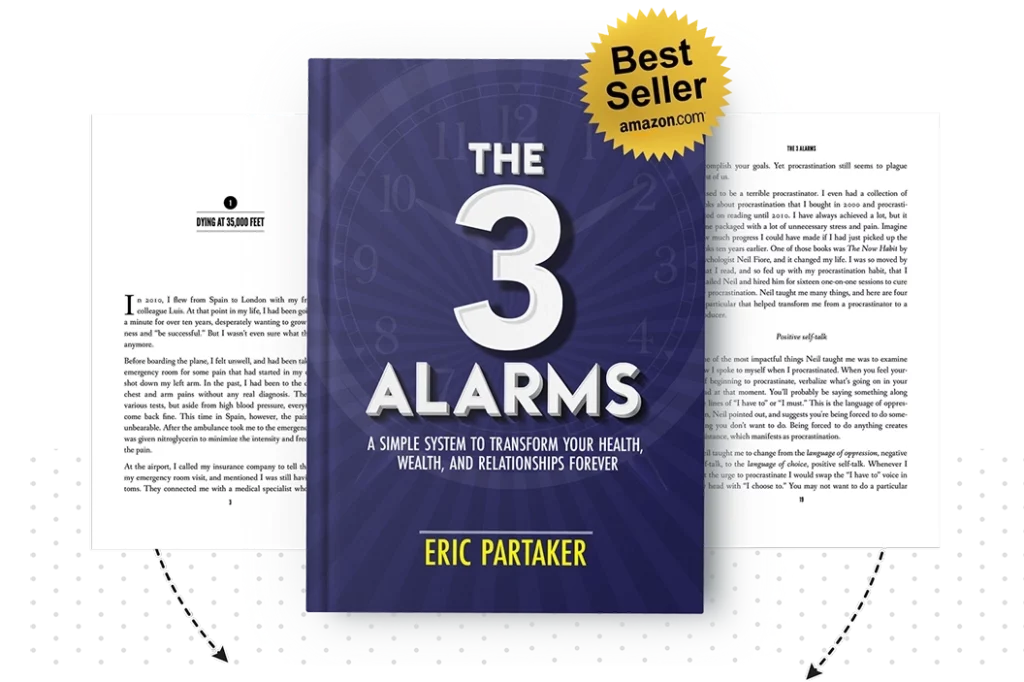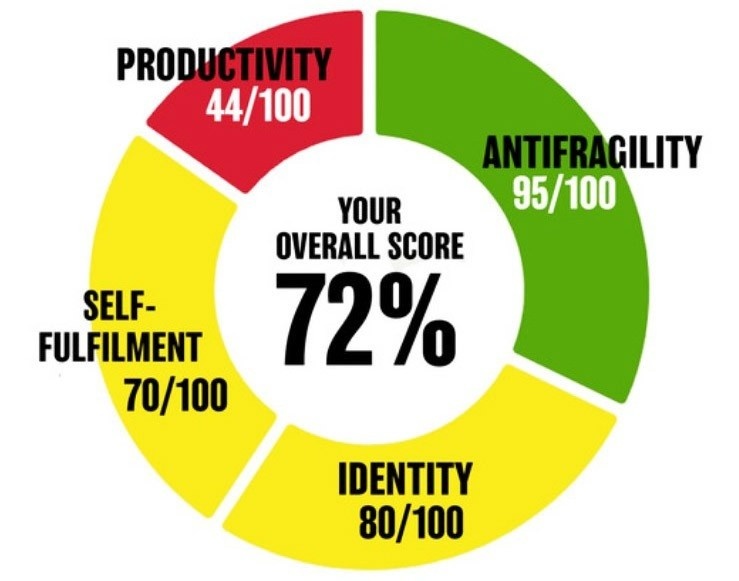SUMMARY
- In this episode I’m going to talk about how you can be better at not overthinking and taking more bold, consistent action. Number one, whatever it is that you’re working on, you got to break it down. No matter what the project is, it can always be broken down into three or five things. It relates to our tendency to procrastinate. When something is too far off into the future, we are far more likely to procrastinate on whatever that is.
- Number two, as part of breaking things down, you need to focus on what’s most important. Where’s the 80/20 in that? There’s 20% of the things that you could do for 80% of the result. You can’t do everything. Focus on what is the highest leverage activities or the highest leverage accent actions.
- Number three, it’s the pro versus amateur thinking. A professional versus an amateur, what’s the difference? An amateur needs to feel like taking action, whereas a professional takes action whether they feel like it or not. How many times have you not taken action because you didn’t feel like it? That’s not how professionals act. That’s the difference between a professional versus an amateur.
- Number four, you need to focus on continually starting. One of the things that gets in the way from us taking consistent action is, we think about something that we want to do, but then we think about, “Oh. I have to finish it.” It then becomes a bit overwhelming and we never get around to doing it. If you just focus on starting, if you just focus on what’s the next thing I can do, the finishing will take care of itself.
- Number five, take a vacation in the present moment. This is from Neil Fiore, author of The Now Habit. Neil gave me this incredible concept of taking a vacation in the present moment, because when we’re not acting when we stop or we hesitate or we don’t go ahead with what we know we should be doing. It’s usually because we’re living either in the past or in the future… Neil taught me to just center take some deep breaths in the moment, and center yourself in that present moment.
- Last but not least, number six. This one comes from Mel Robbins, from her book The Five Second Rule. It’s super simple and practical: the moment you feel the urge to act or the thought that you should be taking action on a goal, a project or a task or something that you know deep down is important to you, you have five seconds to take action before your brain will get too involved and convince you otherwise.
TRANSCRIPT
Stop overthinking and take action. Do you find that you’re often dwelling on something too long before you get up and start moving on it, or maybe you’ve been in a situation where you realize that because you didn’t take action quickly enough, an opportunity, a huge development or potential reward or benefit in your life just escaped you and passed you by. Today, I’m going to talk to you about how you can be better at taking action, because that really is where the power is. Knowledge used to be power, but taking action is today – that’s where the ultimate power is.
Hi, my name is Eric Partaker and I coach CEOs, entrepreneurs, leaders, and individuals in higher levels of performance, helping them achieve the peak that they’re able to achieve, whether that’s in their business or in their life, drawing on my experience from McKinsey and Company, helping build Skype before we sold it to eBay, as well as several of my own entrepreneurial journeys. Let’s dive in on how you can get better at not overthinking and taking more bold, consistent action. Before we dive in, because I’m going to take you through six things that you can do to optimize yourself for action. Before we dive in, I want to talk about how knowledge these days is cheap. Knowledge is to be power. The fact is, I can Google just about anything that I don’t know and within five seconds, I can have the knowledge. It’s not really knowledge. That’s not where the game is played. It’s about translating knowledge into action. That’s where the game is played. Too few people actually do that. They give themselves credit for knowing, and they don’t give themselves credit for doing or worse yet they don’t do. You know what happens in the end? Their dreams pass them by, their lives pass them by.
Then suddenly they’re sitting there in a point of regret, not feeling that they’ve done all the things that they could have done, not feeling that they could have achieved all the things that they were capable of achieving. I don’t want that to happen to you. I have a story to tell you of a client years ago that I had, a CEO. He got into this habit of whenever we were talking about things that he could be doing or improving or ways in which he could elevate his performance to a higher level. He would say, “Yeah. Eric, I know that. Yeah, I know. I know. I know that. I’ve heard that before. Yep. I know that to be true.” I actually forbid him from saying that because every time that he was saying, “I know that.” It’s as if he was giving himself credit for the knowledge, when it didn’t matter. It’s about translating knowledge into action.
It’s about execution. That’s where it counts. Let’s dive in and I’m going to give you six ways in which you can better optimize yourself for taking action and stopping the overthinking and stopping the pondering and actually getting some strong, good, productive, consistent results in either your business or life. Number one, whatever it is that we’re working on, we got to break it down. No matter what the project is, it can always be broken down into three, five things. Whether that’s a big task or a big project. Always try to break it down. This is absolutely because it relates to our tendency to procrastinate. When something is too far off into the future, if we do don’t feel like we’re going to get a taste of that success soon enough, we are far more likely to procrastinate on whatever that is. I’m sure you’ve experienced this.
I’m sure you’ve had these big grand ideas. I’m going to do this in my health. I’m going to do this in my work. I’m going to do this with my family or my home. It sounds great, but because you didn’t actually prioritize, what’s the very next thing I can do. How can I break this down? How can I focus on just the next action? Then focus on that as the goal, because he never got around to doing that, you never actually achieved it. Always break down whatever it is that you want to achieve into at least three to five sub components. Number two, as part of breaking things down, you need to focus on what’s most important. Where’s the 80/20 in that? There’s 20% of the things that you could do for 80% of the result. You can’t do everything. Focus on what is the highest leverage activities or the highest leverage accent actions.
Whereby if I just did more of those things, they’re going to be highly predictive and influence once the success that I’m trying to achieve. There’s a myriad of things that you could be doing. For example, if you want to write a book. Probably the number one thing you need to be doing is just scheduling time in your calendar on a daily basis where you’re actually going to have fingers to the keyboard and you’re actually going to write. Think about it in those terms. What’s the number one, two things that I should be doing, where is the leverage and whatever it is that I’m looking to act upon. Number three, I always liked this construct. I’ve talked about it before in many of my other messages. It’s the pro versus amateur thinking. I’m talking about it again.
Why? Because it’s so important for you to embrace this concept, especially if you want to be taking more action in life. A professional versus an amateur, what’s the difference? An amateur needs to feel like taking action, whereas a professional takes action whether they feel like it or not. This is so powerful if you think about it for a moment. How many times have you not taken action because you didn’t feel like it? Because you just, “I’m not up to it.” That’s not how professionals act. Think about the Olympians out there. How many times does an Olympian in the four or five, six, seven, however many years of training that they did before the actual event. How many times do you think that they thought on a daily basis, “I don’t feel like following the diet plan. I don’t feel like working out. I don’t feel like giving it my all. I just want to sit back and just watch Netflix right now.”
Probably loads of times. What do you think would have happened to their gold metal chances if they allow those feelings to take their actions? Well, they wouldn’t have become a champion, would they? You need to adopt the professional mindset. It’s action which generates feeling. It’s not feeling which precedes action. That’s the difference between a professional versus an amateur. You need to focus on continually starting. One of the things that gets in the way from us can take taking consistent action is often we think about something that we want to do, but then we think about, “Oh. I have to finish it.” Then it becomes a bit overwhelming and we never get around to it. If you just focus on starting, if you just focus on what’s the next thing I can do.
Then when can I start? The finishing will take care of itself and after you’ve started and you’ve worked for a little bit, the very next question you should ask yourself after you finish that period of work is, when can I start again? If you just keep asking yourself that question, when can I start again? When can I start again? When can I start again and schedule it into your calendar, the starting will keep happening and the finishing takes care of itself. Focus on continually starting number five, take a vacation in the present moment. This is from Neil Fiore author of the Now Habit. I’ve talked about Neil before in some of the other messages, videos, podcasts, wherever you’re listening to this. Neil is an amazing guy. I Spent a lot of time working one on one with Neil after reading his book, the Now Habit. I was just blown away by it.
I reached out to him and booked some sessions with Neil and Neil gave me this incredible concept of taking a vacation in the present moment, because when we’re not acting when we stop or we hesitate or we don’t go ahead with what we know we should be doing. It’s usually because we’re living either in the past or in the future. We’re either in the past, which has already happened and doesn’t exist anymore or in the future, which hasn’t happened yet and it doesn’t exist at all. Neil taught me to just center myself, take some deep breaths in the moment, center yourself in that present moment, because if you take a vacation in the present, what you can do simply by breathing deeply with your eyes closed for two minutes. Take your phone and set it to 120 seconds and just breathe deeply to yourself and repeat a word to yourself.
Perhaps repeat the word relaxed over and over and over, but just center yourself in that present moment. When you do that, you actually take a vacation in the present and it’s much more easier to take action. It’s much easier to take action when you’ve done that. Trust me. Give that a try. Number six. This one comes from Mel Robbins from her book with the same title, the Five Second Rule. I love this. It’s super simple. It’s practical. It fights our tendency to overthink. Again, how many times when you’re looking to take action, do you find that you’re convincing yourself otherwise you’re coming up with random ideas or excuses or a ton of reasons why it’s not exactly the right time to take action. The Five Second Rule is super simple. The moment you feel the urge to act or the thought that you should be taking action on a goal, a project or a task or something that you know deep down is important to you, that the best version of you be doing, but maybe that you’re not in the moment.
You have five seconds to take action before your brain will get too involved and convince you otherwise. Let’s say for example, that you want to start working on that book or that project or that presentation or that new strategy or that new business partnership or going to work out or whatever it may be. The thought comes into your mind. “Ah, I should be sitting down to work on that strategy.” Boom, five, four, three, two, one, blast off, start working. Or should I work out this morning? Five, four, three, two, one, blast off, put on your gym shoes, out the door, start working out. This is incredibly powerful. I encourage you to use it, the five second rule. In combination, all of these techniques together will help you stop overthinking, will prime you for action so that you can close that gap between where you are and where you’d like to be.




